Uncover the profound spiritual significance of September in the Bible, a month of ancient feasts and timeless teachings.

September in the Bible
In the tapestry of biblical times, September marks not just the turning of leaves but a period brimming with spiritual significance. You'll find that this month is anchored by solemn feasts and joyous celebrations alike, acting as a bridge between the old and the new.
From the reflective Day of Atonement to the communal Feast of Tabernacles, each event carries layers of meaning that have echoed through centuries. As you explore these ancient customs, you'll uncover their profound impact on modern faith and perhaps see September in a light that's both ancient and surprisingly relevant.
Why not embark on this journey to understand how these historical moments shape contemporary beliefs, preparing to uncover truths that remain as poignant today as they were thousands of years ago?
Key Takeaways
- September is historically significant for its agricultural and religious observances, including harvests and preparation for winter.
- Jewish festivals like the Feast of Trumpets, Day of Atonement, and Feast of Tabernacles occur in September, emphasizing repentance and renewal.
- Agricultural practices such as crop rotation in September reflect biblical themes of stewardship and thanksgiving for providence.
- September's themes of reflection, renewal, and prophetic symbolism influence modern faith and encourage deeper spiritual exploration.
Historical Context of September
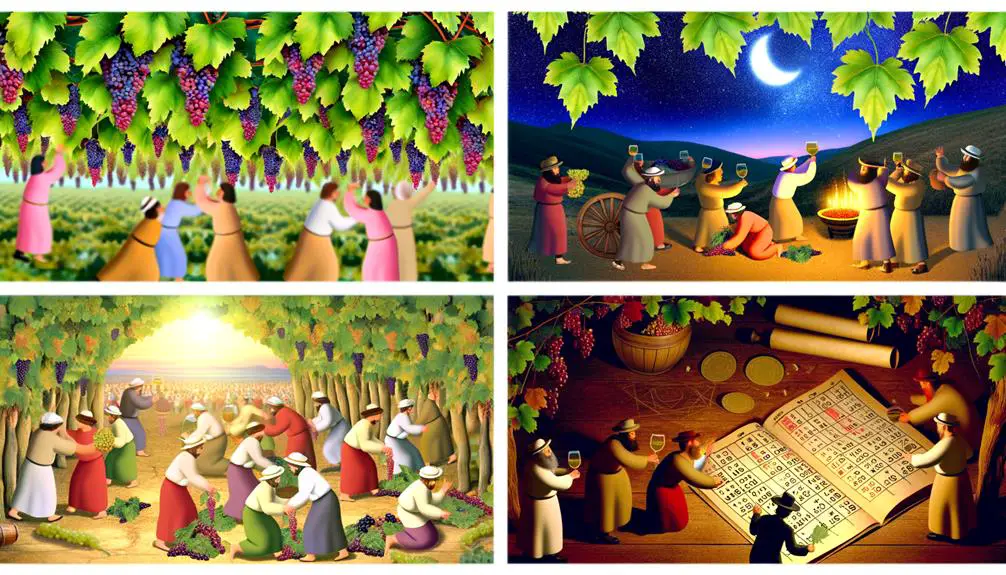
To understand September's significance in biblical times, it's essential to consider its historical context, marked by agricultural cycles and religious observances that deeply influenced ancient societies. The Julian calendar, introduced by Julius Caesar in 45 BCE, significantly impacted how these periods were tracked and celebrated, though it's worth noting that the biblical references to time don't directly correlate with modern calendar months. September, as you'd recognize it, falls at a critical juncture of seasonal shifts, bridging the end of summer and the onset of autumn.
These seasonal shifts were more than just changes in weather; they signified a time of harvest and preparation for the coming winter. In ancient agrarian societies, the success of these harvests was a matter of survival, deeply intertwined with religious practices that sought divine favor for bountiful yields. The timing of these activities, while not explicitly named September in biblical texts, corresponds with the period that the Julian calendar demarcates as such.
Analyzing these cycles provides a window into the daily lives and spiritual mindset of ancient peoples. They didn't passively observe the seasons but engaged with them, integrating their agricultural practices with a calendar that, although different in structure and names from the biblical and Julian calendars, reflected a profound understanding of the natural world's rhythms.
In this light, September's significance transcends its place in the Julian calendar; it represents a pivotal phase of seasonal shifts and agricultural activities that were foundational to the societal and religious structures of biblical times. Understanding this context enriches your appreciation for the historical and spiritual narratives woven through the ancient texts, offering a deeper insight into their timeless relevance.
The Feast of Trumpets
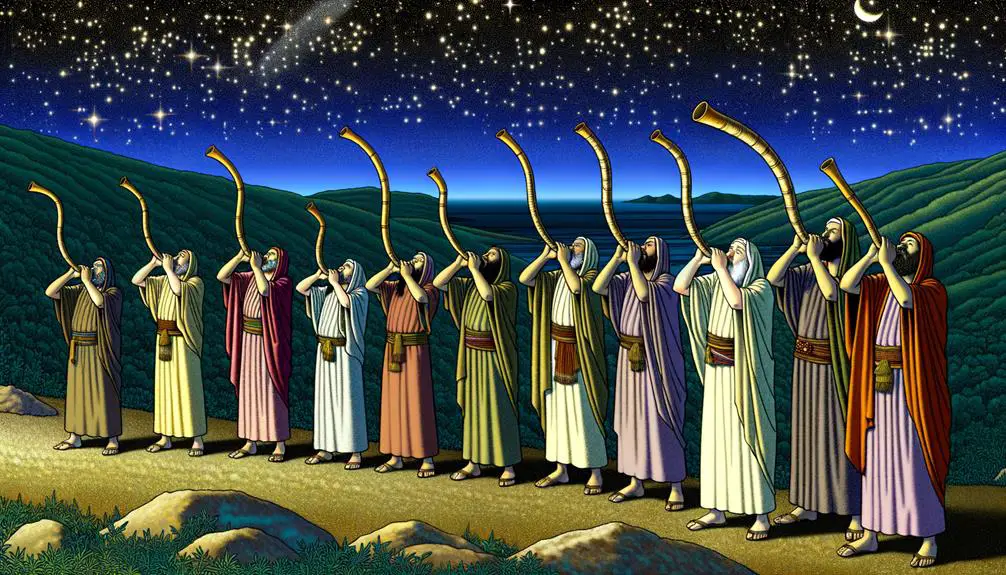
Building on the understanding of September's agricultural and religious significance in ancient times, the Feast of Trumpets emerges as a pivotal observance that marks the beginning of a new year in the Hebrew calendar, deeply rooted in rituals that reflect both thanksgiving and anticipation. This day, rich in symbolism and tradition, utilizes trumpets made from ram's horns, known as shofars, which serve not only as musical instruments but also as sacred tools for communication and spiritual awakening. The choice of trumpet materials, specifically the use of animal horns, ties back to ancient practices and beliefs regarding the natural and divine worlds' interconnectedness.
The musical origins of the Feast of Trumpets are as fascinating as they're complex. The blowing of the shofar, with its distinctive, penetrating sound, isn't merely an act of creating music but a call to reflection, repentance, and renewal. This practice is deeply embedded in the ritual fabric of the observance, serving multiple symbolic purposes, from announcing the commencement of a sacred time to inspiring awe and humility among the participants.
The intricate details of the shofar's sounds—whether a long blast or a series of short notes—carry specific meanings and intentions, underscoring the depth of thought and spirituality that characterizes this feast. Through this analytical lens, we see the Feast of Trumpets as not just a calendar event but a profound expression of human connection to the divine, mediated through the resonant sounds of trumpets crafted from the very essence of creation.
The Day of Atonement
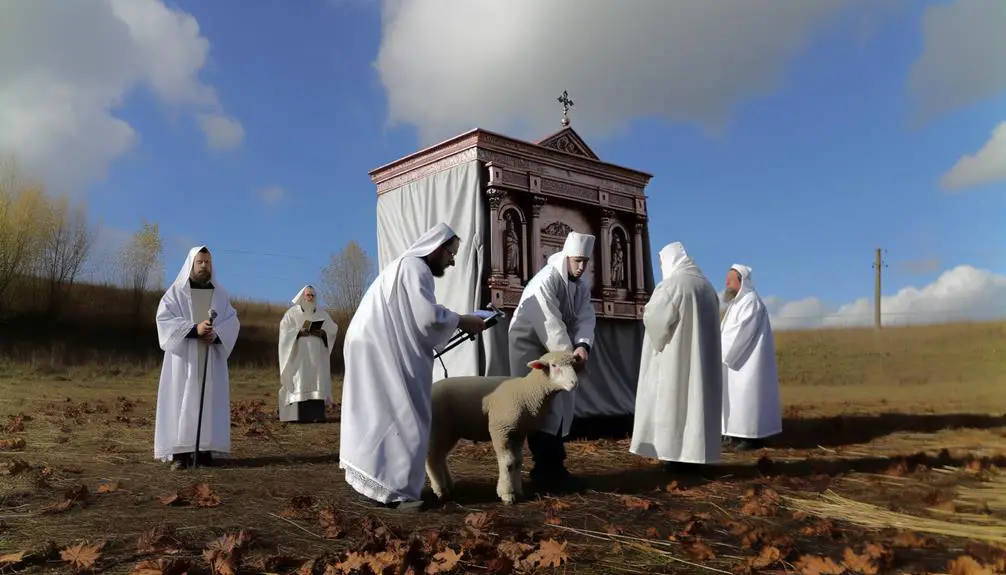
Following the Feast of Trumpets, the Day of Atonement stands as a solemn culmination of reflection and reconciliation, inviting participants into a deep, communal introspection on their moral and spiritual debts. Known as Yom Kippur, this day is the holiest in the Jewish calendar, emphasizing the importance of atonement and repentance through rituals such as Yom Kippur fasting and communal confession. These practices serve not only as expressions of individual contrition but also as a collective endeavor to mend the fabric of communal spirituality and ethics.
Yom Kippur's significance is deeply rooted in biblical tradition, commanding a cessation of work and a rigorous fast. The day is dedicated to prayer, the seeking of forgiveness, and the making of amends, both vertically, in the relationship between individuals and the divine, and horizontally, in interpersonal relationships. This dual focus underscores the comprehensive nature of atonement, encompassing both divine and human spheres.
Aspect |
Significance |
|---|---|
Fasting |
Symbolizes purification, self-denial, and spiritual introspection. |
Communal Confession |
Facilitates collective acknowledgment of faults and the communal pursuit of reconciliation. |
Prayer |
Acts as the vehicle for expressing repentance and seeking divine mercy. |
No Work |
Emphasizes the day's sanctity and allows for full participation in its observances. |
Making Amends |
Encourages the resolution of interpersonal conflicts, fostering community harmony. |
Yom Kippur's practices, rich in symbolism and intent, invite a deep engagement with the concepts of forgiveness, renewal, and human frailty. Through fasting and communal confession, participants are led on a profound journey of self-examination, culminating in a renewed commitment to live in accordance with higher moral and spiritual ideals.
Feast of Tabernacles Explained
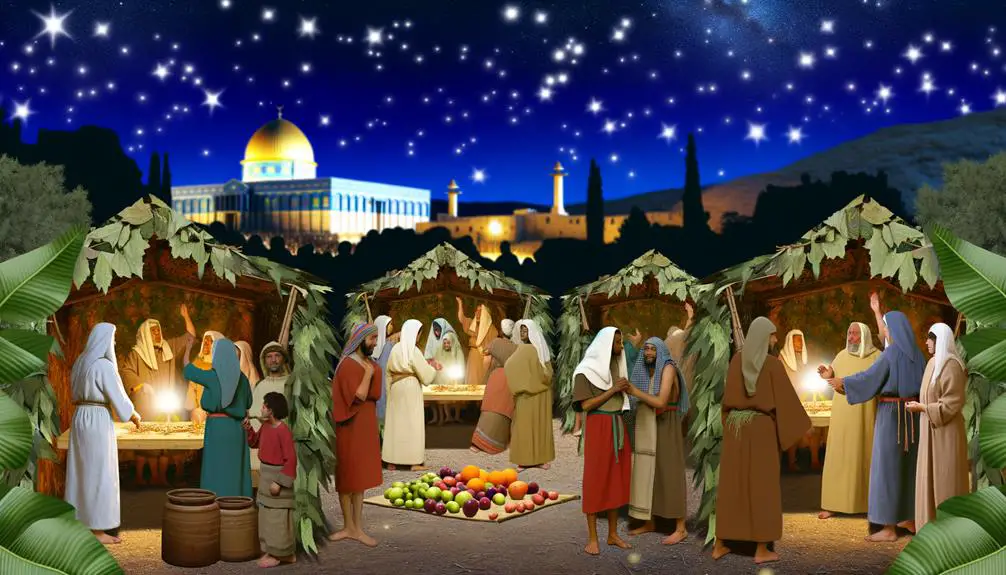
You'll find that the Feast of Tabernacles, also known as Sukkot, has its roots deeply embedded in ancient agricultural practices and historical events as recorded in biblical texts.
This celebration involves specific rituals and practices, including the construction of temporary shelters, to commemorate the Israelites' journey through the wilderness.
In examining its modern observance, you'll discover how this feast has evolved while retaining its core significance across diverse Jewish communities worldwide.
Historical Origins
To understand the Feast of Tabernacles, it's essential to delve into its historical origins, which are deeply rooted in ancient Jewish traditions and biblical mandates. This celebration's inception can be traced back to the Hebrew Bible, specifically Leviticus 23:34-43, commanding the Israelites to observe this festival annually as a commemoration of their ancestors' wilderness journey and dependence on God's provision.
The timing of this feast, initially determined by a lunisolar calendar, underwent significant adjustments with the Gregorian adoption, although Julian remnants in its calculation still influence its observance today. This intricate melding of calendars showcases the festival's adaptability across time, ensuring its continuity and relevance in a modern context while preserving its profound historical and religious significance.
Rituals and Practices
Delving into the Feast of Tabernacles, it's crucial to explore the rich tapestry of rituals and practices that define this ancient celebration, intricately woven with biblical commandments and Jewish traditions.
Central to these rituals are the observances tied to moon phases, which dictate the timing of the festival, aligning it with the lunar calendar to ensure its precise occurrence annually.
The use of anointing oils, deeply embedded in the ritualistic fabric, serves not only as a symbolic purification process but also as a means to consecrate the participants and the sukkah itself. These oils, often infused with myrrh, cinnamon, and other spices mentioned in biblical texts, highlight the sensory experience of the feast, connecting the physical to the spiritual, and the individual to the community.
Modern Observance
The modern observance of the Feast of Tabernacles, while rooted in ancient traditions, has evolved to reflect contemporary religious practices and cultural interpretations. Today, this period is marked not only by religious observances but also intersects with societal milestones such as September weddings and academic beginnings.
These events, though secular, share thematic resonances with the Feast's themes of renewal and community. In analyzing the transformation, one observes a shift towards inclusivity and adaptation, allowing broader participation beyond the confines of strict religious adherence. This evolution signifies a dynamic interface between tradition and modernity, where ancient rituals are reimagined to maintain relevance in contemporary society.
The Feast of Tabernacles thus serves as a compelling example of how religious observances adapt and thrive in changing cultural landscapes.
Agricultural Significance
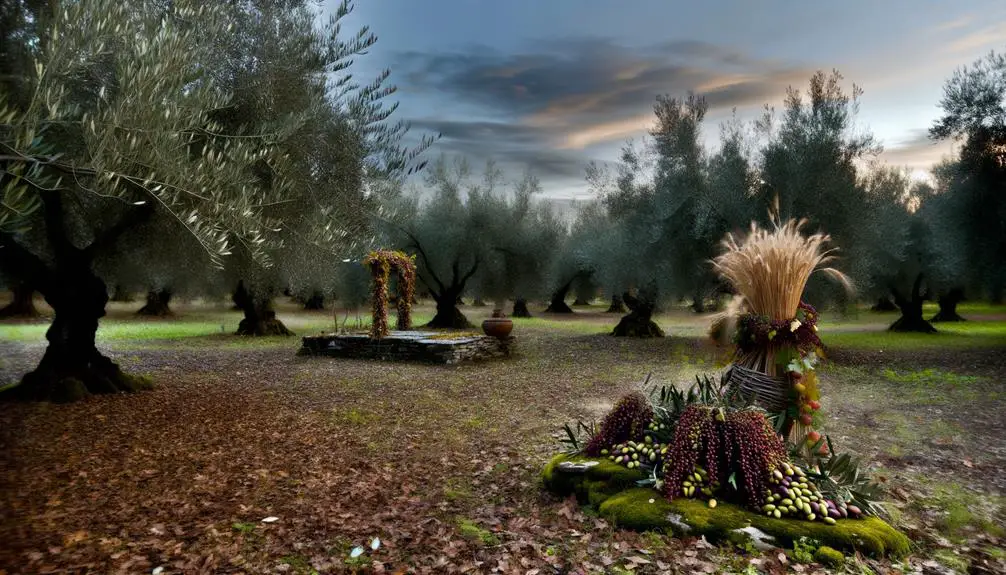
You'll find that September holds a pivotal role in the biblical narrative, particularly through its emphasis on agricultural activities. Harvest time traditions not only mark a period of gathering but also symbolize a moment of thanksgiving and reflection on providence.
Similarly, crop rotation practices, deeply embedded in ancient agricultural wisdom, ensured the sustainability of farming, illustrating a profound understanding of land stewardship and resource management.
Harvest Time Traditions
In September, ancient agricultural societies celebrated harvest time with traditions that highlight the period's significant role in their survival and cultural identity. This month, closely tied to the autumn equinox, symbolizes a time of transition and preparation for the colder months ahead. Communities relied heavily on these harvests, incorporating seasonal recipes that made use of the fresh produce available.
Gratitude Ceremonies: Expressing thanks for the bountiful harvests.
Feasts: Gathering around tables laden with dishes made from the new crops.
Offerings: Presenting a portion of the yield to deities or as a gesture of communal sharing.
Harvest Moon Celebrations: Paying homage to the additional light provided by the moon, crucial for extending work hours in the fields.
These traditions weren't only practical but deeply embedded in the fabric of society, embodying both thankfulness and the cyclical nature of life.
Crop Rotation Practices
Ancient agricultural societies' mastery of crop rotation practices significantly enhanced their food security and soil fertility, marking a pivotal advancement in sustainable farming.
You'll find that these early farmers understood the importance of alternating crops to maintain soil health. By diversifying the types of crops planted on the same plot of land over different seasons or years, they prevented nutrient depletion.
This strategy, coupled with sophisticated irrigation methods, optimized the use of available water, further promoting soil vitality.
As a result, crop rotation practices not only conserved precious soil resources but also played a critical role in stabilizing food supplies.
This ancient wisdom underscores the enduring significance of thoughtful agricultural planning and its profound impact on sustaining civilizations.
Reflection and Renewal

Reflecting on one's actions and seeking spiritual renewal are central themes in September as depicted in biblical narratives. This period, closely aligned with the autumn equinox, invites you to partake in a spiritual harvest, gleaning the wisdom from the past year's experiences. The cyclical nature of seasons in the Bible often symbolizes periods of growth and dormancy, with September marking a pivotal time for introspection and preparation for renewal.
The essence of reflection and renewal during this time can be deeply understood through the following points:
- Self-Examination: The biblical narrative encourages you to look inward, examining your actions, thoughts, and the condition of your heart. This self-scrutiny is akin to the agricultural practice of evaluating the soil's health after a harvest, ensuring it's primed for the next planting season.
- Forgiveness and Letting Go: Just as fields are cleared of old crops, you're encouraged to forgive and release past grievances. This act of letting go is essential for spiritual renewal, making room for new growth.
- Recommitment to Spiritual Practices: The September period is an opportune time to recommit to prayer, meditation, or other spiritual disciplines. This recommitment is symbolic of planting new seeds in well-prepared soil, anticipating a future harvest.
- Community Reflection: The biblical emphasis on community during this time reminds you that reflection and renewal aren't solitary endeavors. Sharing in communal practices enriches your spiritual journey, providing support and accountability.
Impact on Modern Faith

Building on the foundational practices of reflection and renewal discussed previously, it's crucial to examine how these biblical themes influence contemporary faith communities. You'll find that the engagement with these themes isn't static but evolves through cultural adaptations and is enriched by interfaith perspectives. This dynamic process ensures that the essence of reflection and renewal remains relevant and vibrant within modern faith practices.
Cultural adaptations play a significant role in how September's themes of reflection and renewal are observed and celebrated across different communities. For instance, in some cultures, these themes are integrated into local festivals or commemorations that, while rooted in biblical traditions, have been shaped to reflect the unique historical, social, and environmental contexts of the community. This blending of biblical principles with cultural expressions allows faith communities to maintain a living connection to their spiritual heritage in ways that resonate with their current realities.
Furthermore, interfaith perspectives offer a valuable lens through which to explore the themes of reflection and renewal. Engaging with how different faith traditions understand and practice these concepts can foster a deeper appreciation for the diversity of spiritual expression and encourage a dialogical approach to spirituality. This interfaith dialogue enriches faith communities by exposing them to alternative spiritual practices and interpretations that can deepen their own understanding and experience of reflection and renewal.
In essence, the impact of September's themes on modern faith is both profound and multifaceted. Through cultural adaptations and interfaith perspectives, contemporary faith communities are able to reinterpret and reinvigorate these ancient practices, ensuring their continued relevance and vitality in a rapidly changing world.
September's Prophetic Symbolism

Delving into September's prophetic symbolism, you'll uncover layers of meaning that have historically influenced both individual spirituality and collective faith practices. This month, marked by the Autumn equinox, serves as a cornerstone for understanding celestial events and their prophetic implications.
- Transition and Reflection: The Autumn equinox, occurring in September, symbolizes a time of balance between day and night. This equilibrium prompts a spiritual reflection on the harmony and balance within one's life, urging believers to evaluate their personal journey and relationship with the divine.
- Preparation for Harvest: September heralds the time for harvest, both literally in agriculture and metaphorically in spiritual terms. It's seen as a period to reap the rewards of one's faith and labor, highlighting the importance of diligence and faithfulness in spiritual practices.
- Renewal and Release: As leaves begin to change color and fall, September symbolizes a time of letting go of the old to make way for the new. This aligns with themes of forgiveness, renewal, and spiritual cleansing, encouraging believers to release past burdens and embrace future possibilities.
- Prophetic Significance of Celestial Events: Celestial events in September, including the equinox, often coincide with significant Jewish feasts such as Rosh Hashanah and Yom Kippur. These events are rich in prophetic symbolism, representing new beginnings, judgment, and atonement, thus deeply affecting the spiritual rhythm of believers' lives.
Analyzing September's prophetic symbolism offers a profound understanding of how celestial events shape spiritual beliefs, emphasizing a season of balance, harvest, renewal, and deep reflection within the faith community.
Frequently Asked Questions
How Do Different Christian Denominations Interpret the Significance of September Events Mentioned in the Bible Differently?
You're curious about how Christian denominations interpret the significance of events that traditionally fall in September. The differences often hinge on the festival's significance and its cultural impact.
For instance, some view these events as purely historical, while others see deep spiritual meanings. The interpretation can vary widely, from literal to symbolic, each adding layers to the festival's significance, shaping its cultural impact within their community in distinct, nuanced ways.
Are There Any Specific Prayers or Rituals That Individuals Can Perform During September to Align More Closely With Biblical Teachings?
You might consider engaging in seasonal devotion and expressing harvest gratitude through specific prayers or rituals this month.
While the Bible doesn't prescribe September-specific practices, you can align with its teachings by reflecting on themes of thanksgiving and stewardship of the earth.
Incorporating prayers of gratitude for the harvest and committing to acts of generosity and care for creation are meaningful ways to live out your faith during this season.
How Have the Interpretations of September's Events in the Bible Evolved Over the Centuries, Especially With Modern Theological Studies?
As 'time heals all wounds,' so does it deepen our understanding of historical texts. Your exploration into how interpretations of biblical events have evolved shows a keen interest in historical context and interpretive methods.
Modern theological studies have significantly refined our comprehension, employing analytical and scholarly approaches to detail. They've dissected passages with a fine-tooth comb, offering insights that bridge ancient wisdom with contemporary relevance, illuminating the past anew.
Can the Events of September Mentioned in the Bible Be Linked to Any Significant Events in Contemporary World History or Current Events?
You're delving into whether biblical September events have modern parallels, focusing on seasonal symbolism and historical accuracy. It's tricky; the Bible's not a straightforward history book.
Yet, its stories, imbued with deep seasonal symbolism, often mirror human experiences across ages. Analyzing these tales with a scholarly lens, you might find echoes in contemporary events—though drawing direct lines requires careful, detailed analysis to avoid oversimplification or misinterpretation of both biblical narratives and current happenings.
How Do Non-Christian Faiths View the Biblical Events of September, and Do They Have Similar Periods of Reflection and Renewal?
When exploring how non-Christian faiths perceive biblical events, particularly those in September, you'll find cultural comparisons and interfaith dialogues enrich our understanding.
Over 80% of the world follows a religion, highlighting the importance of examining these perspectives. Many faiths have their own periods of reflection and renewal, akin to September's significance in Christianity.
This analysis not only deepens our insight but promotes a more nuanced appreciation of global religious traditions and their interconnections.
Conclusion
As you've journeyed through September's biblical significance, it's like uncovering a layered manuscript, rich with history and meaning.
Consider the ancient olive tree, resilient and ever-bearing, symbolizing both the agricultural roots and the spiritual renewal September embodies.
This month's practices, from the Feast of Trumpets to the Day of Atonement, remind us that faith isn't static but a living, evolving tradition.
They underscore a call to reflection, renewal, and a deeper understanding of our place in the spiritual continuum.



Sign up